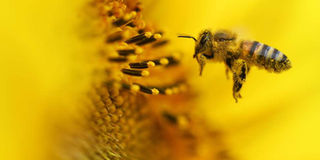Kenya-based centre receives recognition for bee safety

Many governments, Kenya's excluded, have never linked the death of bees to the threat of humanity and the stability of the environment. PHOTO| AFP
A Kenya-based international research centre, the International Centre of Insect Physiology and Ecology (icipe), has received recognition for its work in bee health. Icipe’s studies on bee health are important because they have a bearing on food security
The World Organisation for Animal Health (OIE) assigned ICIPE the “collaborating Centre for Bee Health in Africa”, an acknowledgement that comes in the wake of global concern about the depletion of bees, and how that poses a threat to food security.
Bees are agents of pollination, the process through which plants “mate” and produce food. Icipe’s Director General, Dr. Segenet Kelemu told HealthyNation that the recognition is a testimony that the centre, and others in East Africa, are working hard to save bees.
The centre’s African Reference Laboratory for Bee Health headquartered in Nairobi carried out studies that proved the resilience of the African bee against varroa mites, the insects that are implicated in colony collapse in Europe and the Americas.
Dr. Michael Lattorff, Icipe’s head of Environmental Health termed the mite as the most detrimental to bees because it sucks blood of bees in the larva stage and infects them with viral diseases such as the deformed wing virus.
Similar studies on bees are going on in Burkina Faso, Cameroon, Ethiopia and Liberia as well as training centre in Madagascar.
ENDANGERED SPECIES
For the last decade, more than 12 million beehives have been wiped out from the face of the earth. This is more than 31 per cent of the bee population. In what entomologists call colony collapse disorder, where the worker bees die with serious implications on the ecosystem and economy. The United Nations Environment Programme (UNEP) estimates that of the 100 crop species responsible for providing 90 per cent of food worldwide, 71 are dependent on bee pollination.
While the financial implications of this destruction has not been pinpointed with exactness, UNEP says pollination costs between $37 billion to $91 billion every year. A study conducted by Dr. Muo Kasina, the head of Sericulture in KALRO, indicated that pollinators are responsible for beans, cowpeas, butternuts, sunflower, monkey-nut, tomatoes, capsicum and passion fruit.
Kenya has been experiencing its own fair share of reduction of bees.
A nationwide study by the National Beekeeping Station in 2005 showed that there were 1.4 million hives in Kenya and average honey production was 20 kilogrammes per hive. The number of hives reduced to 1.2 million as honey production dropped to 15 kilogrammes per hive. The honey hives increased slightly to 1.6 million but honey production dropped to an all-time low of to 9.3 kilogrammes per colony. This reduced performance may have been related to the discovery of varroa mites in the region at that time.
In 2013 ICIPE carried out a national survey of the 66 colonies that were investigated for the mites, 83 per cent of them (55) had the mites.
The mite is a new entity to Kenya because there is no mention of their presence in studies by entomologists working in Kenya before 2009.
CREATING AWARENESS
Many governments have never linked the death of bees to the threat of humanity and the stability of the environment. However, Kenya—alongside Ghana and South Africa— has been lauded by the African Union for the work on bees, and their innovative projects to keep them safe. For instance, ICIPE launched a study into the gut microbiota of African honeybees, in a bid to understand the friendly bacteria that provide defence against pathogens. It is hoped that this increased understanding of how gut microbiota influences the health of bees will lay a foundation for microbe-based strategies for bee health management.
These studies and many more are hoped to at least halt the decline of the bee population, and to increase the number of bees because apart from food production, pollination also sustains the genetic variety in crops. Bees also pollinate grasses and forage plants, therefore contributing indirectly to meat and milk production.
SAVE THE BEES
Dr. Wanja Kinuthia, an entomologist based in Kenya, said that there is need for several approaches and studies to save the bees. Farmers, both small- and large-scale, lack the knowledge to link climate change and habitat loss due to deforestation caused by population pressures as a threat to their own farms.
“When farmers are taught little strategies such as when not to slash and burn, or when to spray their farms, bees can be saved,” she said.
The deputy director of the National Beekeeping Institute at the Ministry of Agriculture Dr. Grace Asiko told HealthyNation that a lot of focus was put on large animals such as cattle, at the expense of smaller but important ones like bees.
“We have observed vegetables here at the institute, and we have been able to demonstrate up to more than 80 per cent improvement in crops like strawberries, tomatoes, chillies and
other crops, because of the presence of bees,” she said.
The institute was singled out by the EU-funded Africa Interafrican Bureau for Animal Resources, as a place for training farmers in the region.
It trains Kenyan farmers as well as veterinarians and farmers from Uganda, Tanzania, Zambia and Botswana among other countries.



